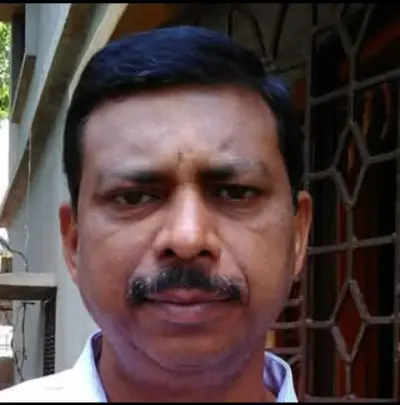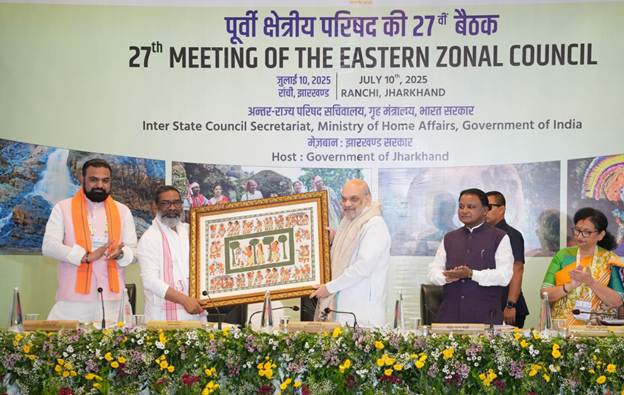

Delhi, July 10: Union Home Minister and Minister of Cooperation Amit Shah chaired the 27th meeting of the Eastern Zonal Council in Ranchi, Jharkhand today. The meeting was attended by Jharkhand Chief Minister Hemant Soren, Odisha Chief Minister Mohan Charan Majhi, Bihar Deputy Chief Minister Samrat Choudhary and Chandrima Bhattacharya, West Bengal Finance Minister, Chief Secretaries and other senior officials of the member states and senior officials of the Central Government.
The Eastern Zonal Council comprises the states of Bihar, Jharkhand, Odisha and West Bengal. The meeting was organized by the Inter State Council Secretariat under the Ministry of Home Affairs, Government of India in collaboration with the Government of Jharkhand.
In his address, Union Home Minister and Minister of Cooperation Shah said that in Operation Sindoor, our forces have made the whole world experience their valor, precision and bravery and for their courage and valor, the Eastern Zonal Council unanimously passes a thanksgiving resolution for the bravery of the forces. He said that Prime Minister Narendra Modi Ji has displayed strong willpower and presented India's strong intention to fight against terrorism to the whole world.
Union Home Minister and Minister of Cooperation Minister said that the land of Jharkhand has contributed a lot in the freedom struggle of the country and many great freedom fighters including Bhagwan Birsa Munda have led the freedom movements of the country from this land. He said that the entire eastern India has been a land of devotion, knowledge, music, scientific research and revolution. He said that Bihar and eastern India have contributed a lot in establishing the basic ideals of education. Shah said that many great personalities including Swami Vivekananda, Birsa Munda, Netaji Subhash Chandra Bose, Dr. Rajendra Prasad, Babu Jagjivan Ram have led the country in many fields from this land. He said that in a way, the confluence of cultural consciousness, devotional consciousness and revolution has happened on this land.
Shah said that Prime Minister Narendra Modi has presented the vision of TEAM BHARAT to the country on the basis of cooperative federalism. He said that under the vision of TEAM BHARAT, we should all move forward together to achieve the goal of development of India through the development of states and making India a fully developed nation by 2047. Union Home Minister said that to strengthen our federal structure, the Inter-State Council and Zonal Council have been given a base in the Constitution and meetings of zonal councils are held under the same. He said that during 2014 to 2025, the pace of organizing these meetings has increased and they have become more productive.
Union Home Minister and Minister of Cooperation Amit Shah said that the Zonal Councils were conceived with the objective of making them a strong foundation of cooperative federalism. He said that the Zonal Councils have now become an actionable platform from an advisory one and through these we have been successful in resolving issues between the Centre and the States and among the States to a large extent. He said that the Zonal Councils have now become an Engine of Cooperation instead of a Forum of Discussion. Shah said between 2004 and 2014, a total of 25 zonal council meetings were held, while between 2014 and 2025 this number reached 63, more than double. He said that we have moved forward from an average of 2 to 3 meetings per year to holding on average 6 meetings per year. Shah said that a total of 1580 issues were discussed in these meetings out of which 1287, i.e. 83 per cent, issues have been resolved, which is a matter of great satisfaction for all of us. He said, the resolution of 83 per cent of issues in the meetings of zonal councils in the Modi government shows the significance of these meetings.
In today's meeting, long pending complex issues related to Masanjore Dam, Taiyabpur Barrage and Indrapuri Reservoir were discussed in detail. Along with this, issues related to division of assets and liabilities of many Public Sector Undertakings (PSUs) between Bihar and Jharkhand states, which were pending since the time of division of Bihar, were also discussed in detail and decisive steps were taken with mutual consent towards their resolution.
Union Home Minister and Minister of Cooperation said Eastern states should make more efforts towards early implementation of three new criminal laws. He said that more work also needs to be done in the matter of narcotics in these states, for which district level NCORD meetings should be held regularly. Shri Shah also said that the four states of the eastern region should go beyond the traditional and structural framework in the field of skill training and prepare courses as per the need.
Shah said due to the unity of all the states and the bravery of the security forces, we have achieved unprecedented success against Naxalism, We will make the country free from Naxalism by March 31, 2026. He said that Bihar, Jharkhand and Odisha have become free from Naxalism to a large extent while West Bengal has already been freed from this problem.
The 27th meeting of the Eastern Zonal Council also discussed a wide range of issues of national importance. These include implementation of Fast Track Special Courts (FTSC) for speedy trial and speedy disposal of rape cases against women and children, brick-and-mortar banking facility within the designated radius of each village, implementation of Emergency Response Support System (ERSS-112) and various issues of common interest at the regional level including nutrition, education, health, power, urban planning and strengthening of cooperative systems.
Five Zonal Councils were established under Sections 15 to 22 of the States Reorganisation Act, 1956. Union Home Minister is the Chairman of the five Zonal Councils and the Chief Ministers/Lieutenant Governors/Administrators of the Member States/Union Territories are its members, of whom the Chief Minister of one State from the Member States is the Vice-Chairman by rotation every year.
Two Ministers from each Member State are nominated by the Governor as members of the Council. Each Zonal Council has also constituted a Standing Committee at the level of Chief Secretaries. The issues proposed by the States are first placed for discussion before the Standing Committee of the respective Zonal Council. After consideration in the Standing Committee, the remaining issues are placed for consideration in the meeting of the Zonal Council.